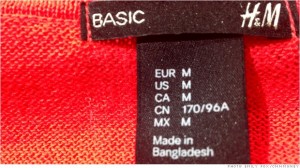The recent string of factory collapses in Bangladesh has shed more light into the dismal working conditions and safety standards of big- brand clothing manufacturing factories in developing countries. After the infamous Nike scandal during the 1990’s, one would think that big clothing chains would start to give more thought into how the clothes were being produced, rather than how cheap the clothes can be produced for. And given the ever growing “ethical” trend, one would also think that companies would start capitalizing on that trend- regardless if its to increase their revenues or create a good reputation. But the fact that these large companies are still turning a blind eye when it comes to safety standards and the wellbeing of the factory’s workers shows that there is still very much to be done about the lack of concern there in the corporate world regarding ethical matters. And the fact that all the fuss about signing safety standard agreements only began after the tragedy occurred also shows that these companies aren’t able to properly judge the consequences of careless outsourcing of production. The issue of minimum wage is a debatable one, as it is the case that the government of the factory’s country plays a crucial role in enforcing that, but large companies should not have a careless attitude by choosing to shrug off these issues, because they can actually choose to make a difference by simply conducting safety inspections before outsourcing. And with consumers growing more and more ethically- conscious, it should be a further incentive (if any is even needed in the first place) for large companies to actually care.
High Safety vs Low Cost: A look into the recent factory collapses in Bangladesh
Reply

